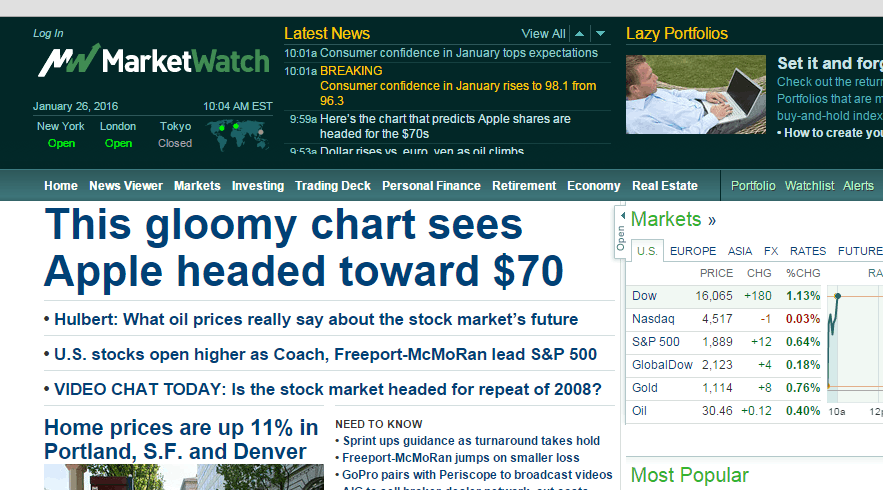
From the Slope of Hope: Over the past ten months, in steps almost too small to be noticed by the mass media, Apple has shed over two hundred billion dollars in value. That's nearly one quarter of a trillion dollars in wealth which would have fed shareholder dreams of new houses, new boats, new jewelry, and mink coats, but..........it's gone.
The thing is, I think the slide is far, far from over. I wrote a piece earlier this year (which got picked up by some of the mainstream press) predicting that Apple would fall to the mid-70s. We're already heading into the low 90s, so my goofy prediction is seeming a little less insane.
Of course, it wasn't that long ago that buying Apple was a "no brainer" - indeed, a "bargain." God knows it wasn't hungry for media attention. This is the unedited home page of MarketWatch a while back:
[image]https://slopeofhope.com/wp-content/uploads/2015/09/0910-aapl.png[/image]
So what's behind this fall? Lots of things (not the least of which is a wildly-overvalued market which, ultimately, will pound the Dow back into 4-digit land), but for Apple specifically, I think it's simple: the magic is gone again.
When I say "again", I am referring to something in my own personal experience. I worked at Apple HQ from 1987 to 1990. Steve Jobs had left the company two years earlier, although there was still Jobsian memorabilia scattered about (such as the 1985 planning binder from the Finance department which had an image of a dollar bill with Steve's face instead of George Washington's; on the bottom of the dollar bill were the words In Jobs We Trust).
This was the Sculley era. That is, John Sculley, the Pepsi boy whom Jobs famously lured to Apple in the early 1980s and, by the late 1980s, was sailing along with the winds of Jobs' former product prowess pushing his sailboat of prosperity forward (kind of like that Cook fellow is doing right about now).
Sculley had no business running a high tech company that desperately needed innovation, but it takes years for these things to become apparent. Over the course of time, though, particularly after Sculley was booted and even worse CEOs came along, the products becoming increasingly bland, ordinary, and awful. Along with this, the names became less meaningful and far greater in number, eventually making it impossible for anyone to understand what the product grid looked like. For instance, there was the "Quadra" line, and just one of the many beige boxes Apple would crank out in the late 1980s and early 1990s:
And the "Performa" line (are you noticing how meaningless these names are yet?)
And, God help us, the "eMate":
They even tried going into the camera market, long before the technology to support a good digital camera existed yet. I give you the QuickTake 200:
It's no small wonder that Jobs blew up almost all the existing products and product plans when he came back to Apple in 1997. And, of course, the products the Jobs brought out during his second reign at Apple are the stuff of legend, and there have been hundreds of billions of dollars of these products sold.
Of course, Mr. Jobs is long gone (for good, this time), and Tim Cook with his impish grin has been trying to lead the company forward. People gave him plenty of slack, because Apple's stock price kept chugging higher for years after Jobs' death. That all ended last April, however, and I am highly confident that Apple will never seen its stock price cross that level again..........ever.
As with the 1985-1996 "Steve Jobs isn't here" era, it takes time for things to corrode, erode, and fall apart. But the signs are starting to show. For one thing, product design appears to be heading back toward "ugly", with bizarre offerings like this recent entry, which looks like an iPhone with a malignant tumor:
Added to this, the clean, simple, easy-to-understand names (iPod, iPhone, iPad) are beginning to take on the appendages that corrupted the product names back when I worked at the firm, such as the forthcoming "iPhone 5 se" which, I gather, is their cheap version of the product for poorer countries (I'll leave the topic of chasing low-margin third-world markets alone).
The bottom line is that Apple lost its founder, its leader, its passion, and its way. Get used to a double-digit stock. It's got much lower to go.